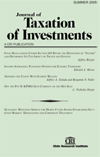529 Plans: Federal Tax Benefits and State Tax Distinctions
Author: Katherine M. Hetherington.; Timothy R. Hurley.
Source: Volume 34, Number 01, Fall 2016 , pp.53-88(36)

< previous article |next article > |return to table of contents
Abstract:
A 529 plan grows tax-free for the benefit of a child’s future college and graduate school expenses. However, 529 plans are subject to complicated federal and state tax rules, with the latter different in every state. Federal and state laws are consistent with respect to tax-free growth and tax-free withdrawals for education expenses. Otherwise, however, the tax treatment diverges. In this age of mobility, investors and advisors both will benefit from understanding the variety of state taxation policies related to 529 plans. This knowledge can inform decisions about whether to have multiple accounts for the same beneficiary, to open an out-of-state account, or to open a new account in the event of an interstate move. This article discusses federal and state tax consequences at every stage in a 529 plan’s lifecycle, and also includes a table comparing the tax benefits and burdens in all 50 states and the District of Columbia.Keywords: 529 plan, contribution deduction, education expenses, nonqualified withdrawal, tax benefits, prepaid tuition, recapture, tax-free growth, state taxation
Affiliations:
1: San Francisco State University; 2: Ithaca College.